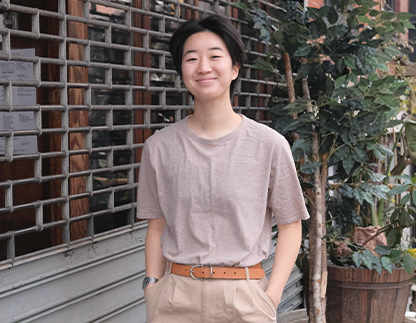At the end of the day, the path you choose will only be as desirable as your urge to travel it.”
Phoebe Pan
PhD Candidate in English

Phoebe Pan is a PhD candidate in English in the Weinberg College of Arts and Sciences. Their research explores early modern poetry as a space for constructing gender, highlighting its deep connections to trans experiences and challenging the view of transness as purely modern. Phoebe is a Mellon Cluster Fellow in the Science in the Human Culture Program.
How would you describe your research and/or work to a non-academic audience?
In the simplest of terms, I research what poetry can do for trans people and what transness does to poetry. Specifically, I turn to the early modern period to think about poetry as a method of gender-making, as a space where writers crafted, copied, and edited gender across lines bejeweled with herbs, beasts, carats, shipwrecks, stolen goods.
I’m interested in the productive disorientation that a lot of early modern poetry produces, as it asks us to think about gender construction beyond the unit of the individual and what it would look like to focus instead on the structures, affects, and (il)logics that inform experiences of gender. My interest in the early modern period also comes as a resistance to the narrative that transness is a “contemporary” phenomenon—the early moderns were, by all accounts, extremely trans, in ways we find difficult to imagine or consider now!
Whom do you admire in your field and otherwise, and why?
I’m spoiled for choice—alongside my brilliant dissertation advisors (Laurie Shannon, Jeffrey Masten, and Michelle Huang), there are so many incredible scholars in early modern studies, in trans studies, in early modern trans studies—so I’ll rattle off some that come to mind immediately: Colby Gordon, Leah DeVun, Abdulhamit Arvas, Katie Kadue, Vin Nardizzi, to name only a few. I’m drawn to scholars who can move trans-historically, who manage to unearth fresh and imaginative readings from the most well-trodden of texts, who aren’t afraid to think about the political and ethical stakes of their research and the fields they occupy.
What books are on your bedside table?
A lot of poetry and speculative fiction! Tarik Dobb’s Nazar Boy, Jos Charles’ a Year & other poems, Alexandra Grunberg’s Merchant, and Renee Gladman’s My Lesbian Novel are a few favorites from the bedside stack.
What did you originally want to be when you grew up?
I had a few dreams that I kept in rotation: a park ranger, a carpenter, a marine biologist, a lighthouse keeper. For better or worse, I was never really drawn to the idea of a lucrative occupation—even as a kid, I think I much preferred spaces of discovery and steady contemplation. Which I suppose I've found, circuitously, in academia.
What advice would you give your younger self or someone considering a similar path?
I don’t have advice so much as I have questions that were important to me in deciding where I wanted to be and what I wanted to do with my life: “What is urgent to you? How do you want to grow? What can you do with your particular skill sets? What philosophies and modes of living matter to you? What do you have to give?” These will always be active questions, and there will always be arguments made for the “practicality” or “usefulness” of certain career paths. At the end of the day, the path you choose will only be as desirable as your urge to travel it.
Tell us about a current achievement or something you're working on that excites you.
Alongside my dissertation, I’m currently working on a poetry chapbook! It’s a short collection of what I’m calling “fable poems,” or poems that toy with trans existence through the lens of fantastical allegory and the genre of the bestiary. It’s nice to be working on a creative project in tandem with my research, as I’ve found that writing poems makes me think about reading them in a different way, and vice versa.
Publish Date: December 17, 2024
If you know a graduate student, postdoctoral scholar, graduate faculty member, staff member, or a member of our TGS alumni population who would make a great candidate for our TGS Spotlight Series, please complete this brief TGS Spotlight Series Nomination Form.